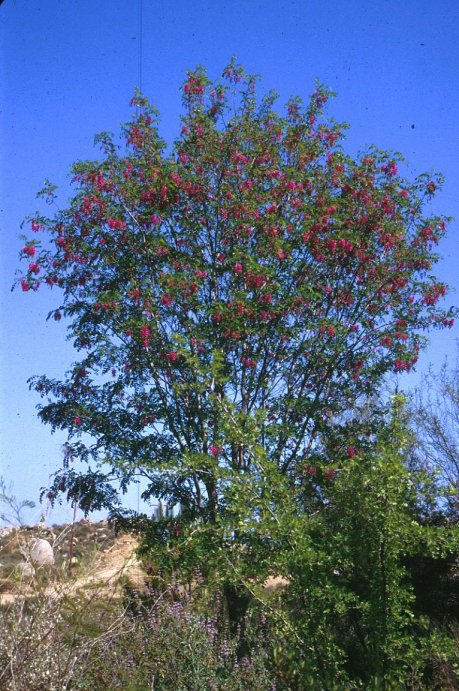| Botanical Name: Robinia pseudoacacia 'Purple Robe' | |
| Common Name: Purple Robe Locust |

-
Anatomy
-
Culture
-
Design
Plant Type
Tree
Height Range
25-40'
Flower Color
Pink, Purple
Flower Season
Spring, Summer
Leaf Color
Blue Green
Bark Color
Brown, Grey
Fruit Color
Brown
Fruit Season
Summer, Fall
Sun
Full, Half
Water
Low
Growth Rate
Fast
Soil Type
Sandy, Clay, Loam, Rocky, Unparticular
Soil Condition
Average, Rich, Poor, Well-drained, Dry
Soil pH
Neutral
Adverse Factors
Invasive, Poisonous, Thorns/Spines
Design Styles
Mediterranean, Ranch, Spanish
Accenting Features
Showy Flowers, Specimen
Seasonal Interest
Spring, Summer
Location Uses
Background, Shrub Border
Special Uses
Shade Tree
Attracts Wildlife
n/a
Information by: Stephanie Duer
Photographer: Susan Frommer
Photographer: Susan Frommer
-
Description
-
Notes
Purple Robe Locust is a medium-sized upright tree, growing 40 feet in height with a compact, rounded form. The trunk is long and straight with an interesting branching pattern. Leaves are dull, dark blue-green and pinnately compounded. Fall color is yellow. Flowers are dark rose-pink, in dense clusters, May to June. Lonf, slender pods follow flowers and persist into autumn. Bark is warm gray and furrowed; branches have spines.
Hardy to zone 3, this locust prefers full sun, is tolerant of most soils and fixes nitrogen. It is not a tree for stressful planting situations in dry climates. Provide adequate water during establishment and moderate watering thereafter. Borers can be problematic following stress. Should be pruned in late summer to avoid "bleeding."